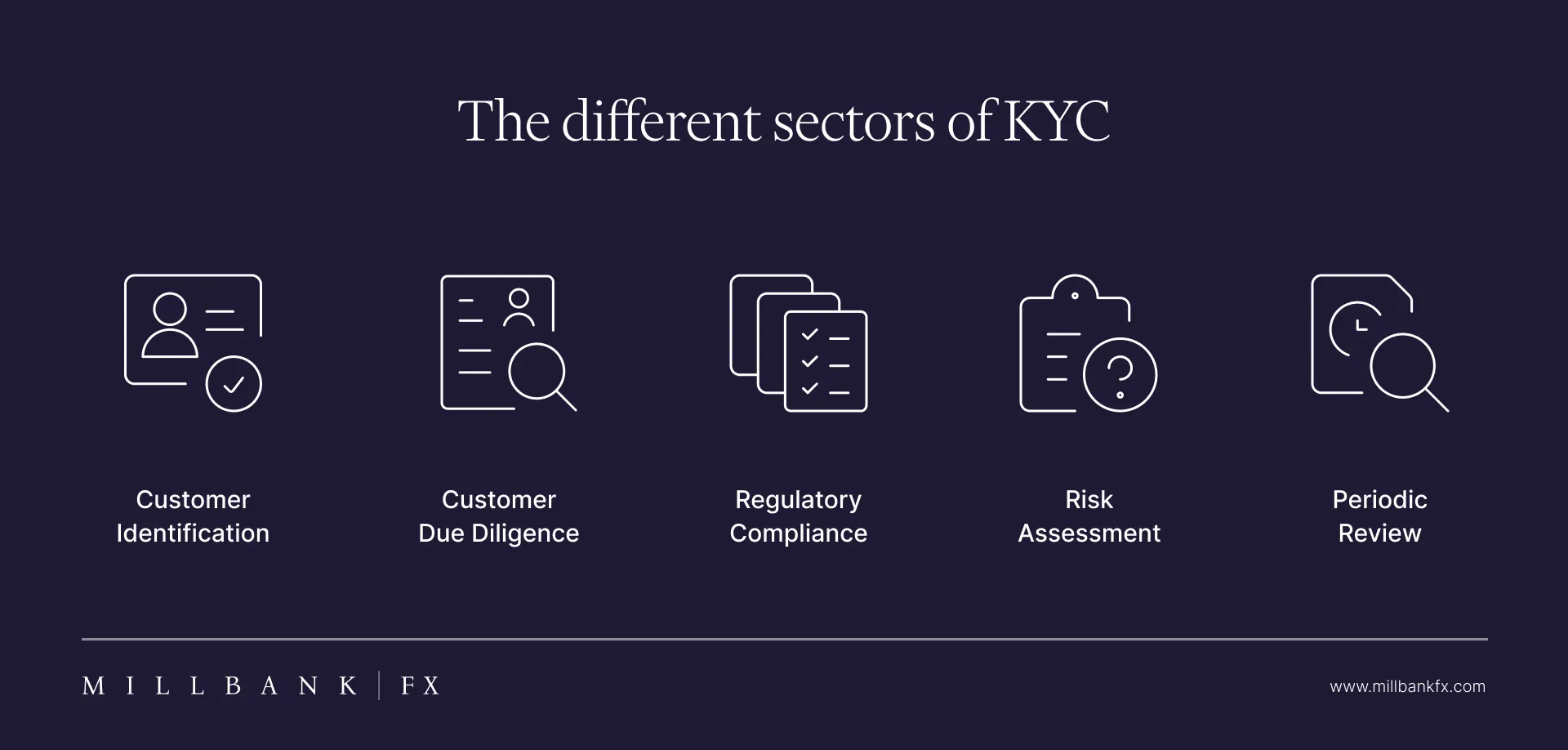Warum ist KYC für britische Importeure wichtig?
Know Your Customer (KYC) -Prozesse sind eine wichtige, aber häufig missverstandene Komponente des grenzüberschreitenden Handels für britische Importeure. Ein robustes KYC dient nicht nur als regulatorische Anforderung, sondern wirkt sich auch direkt auf die Geschwindigkeit des Onboardings, die Bankbeziehungen und die Gesamteffizienz internationaler Zahlungen aus. In so unterschiedlichen Sektoren wie Elektronik, Bekleidung, Lebensmittel, Metalle und Landwirtschaft spielt KYC eine grundlegende Rolle, wenn es darum geht, Vertrauen aufzubauen und reibungslose grenzüberschreitende Transaktionen zu ermöglichen. Dieser Leitfaden enthält bewährte Verfahren und praktische Ratschläge für branchenübergreifende Finanzmanager, die ihren KYC-Ansatz in der heutigen Compliance-Landschaft optimieren möchten.

Was ist KYC und warum benötigen Importeure es?
KYC (Know Your Customer) ist eine Reihe von Due-Diligence-Verfahren, die britische Finanzinstitute und Zahlungsdienstleister durchführen müssen, um die Identität und Legitimität ihrer Geschäftskunden zu überprüfen, bevor sie ihnen den Zugang zu Dienstleistungen wie grenzüberschreitenden Zahlungen, Geldwechsel oder Absicherungslösungen gewähren. Für Importeure ist die Einhaltung der KYC-Vorschriften aus mehreren Gründen wichtig:
- Es erfüllt die Anforderungen britischer Behörden, Banken und von der FCA autorisierter Anbieter zur Bekämpfung von Geldwäsche und Betrug.
- Es schafft Vertrauen in Gegenparteien und Zahlungsanbieter und vereinfacht die globale Zahlungslogistik.
- Ein optimiertes KYC reduziert potenzielle Verzögerungen und Kostenüberschreitungen aufgrund blockierter Überweisungen oder eingefrorener Konten.
Wichtige KYC-Anforderungen
In allen Sektoren gehören zu den allgemeinen Anforderungen für Importeure, die neue Finanzbeziehungen eingehen, Folgendes:
- Überprüfung der Geschäftstätigkeit (Firmenregistrierung, gültige Geschäftsadresse, Gründungsdokumente)
- Identifizierung der Direktoren/Eigentümer (Reisepass, Führerschein oder Personalausweis)
- Nachweis der Geldquelle (Kontoauszüge, Rechnungen, Verträge)
- Verständnis der beabsichtigten Aktivität (Art des Geschäfts, Länder, mit denen gehandelt wird)
KYC sektorübergreifend: Praktische Unterschiede
Obwohl die wichtigsten Dokumente ähnlich bleiben, steht jeder Sektor beim KYC-Onboarding vor einzigartigen Herausforderungen:
- Elektronik Importeure müssen aufgrund des Risikos gefälschter Waren oder Güter mit doppeltem Verwendungszweck häufig ihre Legitimität in der Lieferkette nachweisen.
- Essen Branchenimporteure müssen häufig zusätzliche Zertifizierungen vorlegen, z. B. pflanzengesundheitliche Unterlagen oder Nachweise zur Lieferantenüberprüfung.
- Metalle Unternehmen können auf Fragen rund um die Beschaffung von Schrott oder Konfliktmineralien stoßen.
- Bekleidung Importeure werden zu Werksaudits und zur ethischen Rückverfolgbarkeit der Lieferkette befragt.
- Landwirtschaft Importeure können mit einer genaueren Prüfung ihrer Ursprungsdokumente rechnen, insbesondere bei Produkten aus Schwellenländern.
Schrittweises KYC-Onboarding für Importeure
Wenn Sie den allgemeinen KYC-Prozess verstehen, können Sie Stress reduzieren und Engpässen vorbeugen:
- Erstanwendung: Geben Sie Unternehmensinformationen und grundlegende Informationen zu den geplanten Zahlungsvolumina und Regionen an.
- Einreichung des Dokuments: Digitaler Upload von Personalausweis, Adressnachweis, Firmenregistrierung und (falls erforderlich) unterstützenden Verträgen.
- Sorgfaltspflicht: Der Anbieter überprüft die Unterlagen und kann Klarstellungen oder weitere Nachweise anfordern (insbesondere zur Herkunft der Geld/des Vermögens).
- Risikobeurteilung: Automatisierte und manuelle Kontrollen auf PEPs (politisch exponierte Personen), Sanktionen und negative Medien.
- KYC-Zulassung: Sobald Sie zufrieden sind, ist die Kontoaktivierung in einfachen Fällen in der Regel innerhalb weniger Stunden abgeschlossen.
- Laufende Überwachung: Anbieter können regelmäßige Aktualisierungen anfordern, insbesondere wenn sich das Geschäftsvolumen oder die Gegenparteien erheblich ändern.
Wie KYC die Margen der Importeure schützt
Konsistentes KYC erfüllt nicht nur die Einhaltung der Vorschriften, sondern schützt auch die Gewinnmargen, indem es Folgendes sicherstellt:
- Schneller Zugriff auf wettbewerbsfähige Devisenlösungen, wenn Sie sie benötigen.
- Geringere Reibungsverluste bei der Freigabe von Lieferantenzahlungen, wodurch Standzeiten oder verspätete Strafen vermieden werden.
- Reibungsloseres Cashflow-Management, da es weniger wahrscheinlich ist, dass Gelder in Erwartung zusätzlicher Informationen zurückgehalten werden.
Ein optimierter KYC-Prozess hilft Importeuren, das Risiko verzögerter Lieferungen oder zusätzlicher Bankkosten zu mindern, was die Margen schmälern kann — insbesondere in Sektoren, in denen Währungsschwankungen von 2% bei einer Bestellung von 1 Mio. GBP einen Unterschied von 20.000 GBP bedeuten könnten.
Reduzierung der KYC-Probleme: Tipps für britische Finanzmanager
- Halten Sie alle rechtlichen Unterlagen auf dem neuesten Stand und digitalisieren Sie sie für einen schnellen Zugriff.
- Arbeiten Sie mit erfahrenen, von der FCA autorisierten Anbietern zusammen, die Sie bei branchenspezifischen Anforderungen unterstützen können.
- Binden Sie Compliance-Teams frühzeitig ein, wenn neue Handelspartnerschaften oder Regionen in Betracht gezogen werden.
- Teilen Sie Ihrem Kundenbetreuer im Voraus das erwartete Zahlungsvolumen und ungewöhnliche Aktivitäten mit.
- Ermutigen Sie Lieferanten, rückverfolgbare, überprüfbare Aufzeichnungen zu führen, um die Sorgfaltspflicht Dritter zu optimieren.
Für Importeure, die Absicherungsprodukte wie Terminkontrakte verwenden, wünschen sich Anbieter möglicherweise auch einen klaren Überblick über die zugrunde liegenden Geschäftsrisiken und potenziellen Sicherheitenvereinbarungen.
Häufige Fallstricke und wie man sie vermeidet
- Unvollständige Dokumente: Stellen Sie sicher, dass Signaturen, Daten und alle Seiten in den eingereichten Dateien vorhanden sind.
- Langsame Reaktion auf Anfragen: Reagieren Sie umgehend auf Anfragen nach Klarstellungen, um Verzögerungen beim Onboarding zu vermeiden.
- Veraltete Unternehmensdaten: Informieren Sie Ihren Anbieter über jede Änderung der Direktoren, Aktionäre oder Handelsadressen.
- Ich rechne nicht mit einer verstärkten Sorgfaltspflicht: Sektoren, die als risikoreich eingestuft werden (bestimmte Elektronik, Metallquellen oder Lebensmittelherkunft), benötigen möglicherweise zusätzliche Nachweise.
Gründliches KYC: Ein strategischer Vorteil
Umfassende KYC-Prozesse sind weit davon entfernt, ein regulatorischer Haken zu sein, sondern positionieren Importeure als zuverlässige, gut vorbereitete Partner für Lieferanten und Banken gleichermaßen. Die proaktive Einhaltung der Vorschriften reduziert die Einführungszeiten bei neuen Devisen- oder Zahlungsanbietern, optimiert den Cashflow und schafft Vertrauen bei internationalen Geschäftspartnern.

KYC als fortlaufender Prozess
KYC ist kein einziges Mal abgeschlossen und vergessen. Jährliche Überprüfungen, Wechsel in der Geschäftsleitung oder im Aktienbesitz sowie signifikante Veränderungen des Handelsvolumens oder der Lieferantenbasis werden allesamt neue Kontrollen nach sich ziehen. Die Leiter der Finanzabteilung sollten einen offenen Dialog mit ihren Anbietern führen und mit regelmäßigen Anfragen nach aktualisierten Informationen rechnen.
Digitales KYC und Zukunftstrends
Aufgrund des zunehmenden digitalen Onboardings ermöglichen viele Anbieter — darunter Millbank FX — einen Großteil des KYC-Prozesses über sichere Online-Portale, wodurch der Papierkram reduziert und Genehmigungen beschleunigt werden. In Zukunft werden gemeinsame digitale KYC-Frameworks und verbesserte Datenstandards die Reibung weiter verringern und für branchenübergreifende Importeure einen noch größeren Mehrwert schaffen.
Rationalisierung der Compliance, ohne das Wachstum zu behindern
Ein effizientes KYC ist für jeden britischen Importeur unerlässlich, der mit ausländischen Lieferanten oder Währungen zusammenarbeitet. Indem Importeure sich im Voraus vorbereiten, die Besonderheiten der Branche verstehen und mit Anbietern zusammenarbeiten, die Wert auf Schnelligkeit und Transparenz legen, können sie sowohl ihre Margen als auch ihren Ruf schützen.




